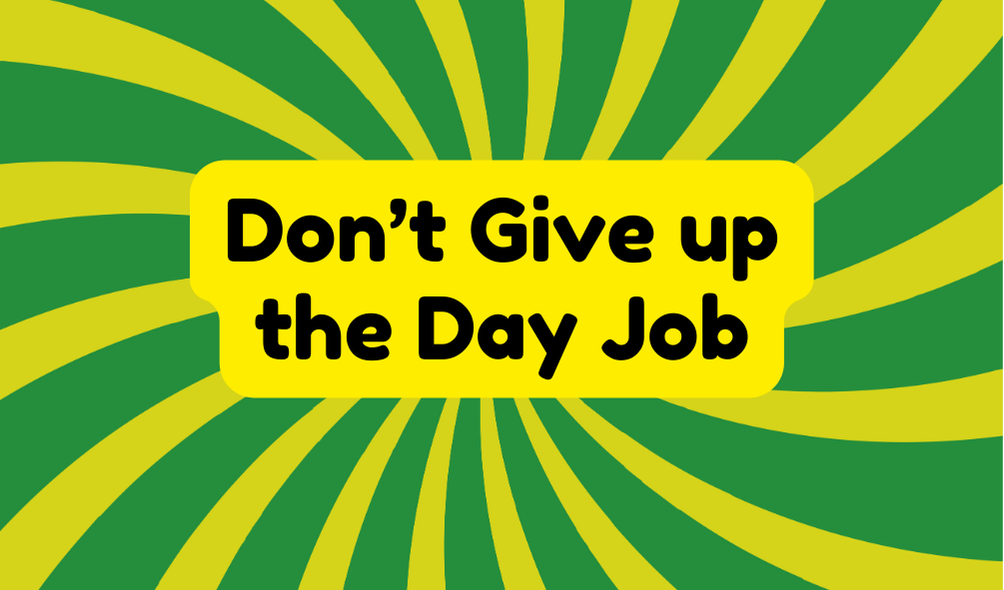"Don't give up the day job" serves as a cautionary phrase aimed at aspiring artists. It emphasizes the need for financial security while pursuing creative passions. Many artistic endeavors can be unreliable, and relying solely on them can lead to disappointment. As a result, maintaining a steady job is essential for stability. This advice encourages individuals to balance their artistic goals with practical income sources. For further insights into this concept, additional details await exploration.
Synonyms
When exploring the phrase "Don't give up the day job," several synonyms capture its essence, reflecting the underlying caution about pursuing unpromising creative endeavors. This humorous advice often serves as a gentle nudge towards realism, particularly for those initiating artistic pursuits that may prove challenging. Alternatives to the phrase include:
- Stick to your strengths
- Stay grounded
- Know your limits
- Pursue hobbies, not professions
- Keep your day gig
These expressions emphasize the importance of maintaining one's primary job while dabbling in creative outlets, underscoring a pragmatic approach to the uncertainty surrounding artistic aspirations.
Example of Sentences
Numerous individuals commence creative pursuits without fully recognizing their limitations, often leading to the advice, "don't give up the day job." This phrase serves as a cautionary reminder, urging aspiring artists to maintain their primary sources of income while exploring their artistic aspirations. Clarity can be found through practical examples:
- "Watched your performance at the theater today. My advice is don't give up your day job."
- "Want to try writing a novel? Based on your drafts, I advise you not to give up your day job."
- "If you liked my singing, remember: don't give up your day job."
In balancing careers and passions, realism prevails.
Origin
The origin of the phrase "don't give up the day job" is not definitively established but often points to a historical context where aspiring actors juggled their theatrical ambitions with conventional employment. This expression reflects societal views that value traditional job security over potentially unstable artistic pursuits. In earlier times, many performers worked during the day and entertained at night, highlighting the necessity of having a steady income. By encouraging individuals to maintain their day jobs, the phrase subtly critiques the allure of risky artistic endeavors, offering a pragmatic perspective on the balance between passion and practicality in professional life.
Collocations
Collocations associated with the phrase "don't give up the day job" often highlight various creative and artistic disciplines. These phrases illuminate the skepticism surrounding artistic aspirations, especially when individuals pursue endeavors that may yield unexpected outcomes. Common collocations reflect the tension between professional obligations and creative pursuits, implying a need for balance:
- Day job vs. artistic ambitions
- Pursuing passions realistically
- Balancing work and creativity
- Steering through creative failures
- Acknowledging artistic limitations
These expressions serve as reminders that while creativity is essential, it often coexists with the practicality of maintaining reliable employment. This blend of critique and encouragement aims to guide aspiring artists toward realistic goals.
How to Use in Everyday Language
How can individuals effectively incorporate the phrase "don't give up the day job" into everyday conversations? This expression reflects cultural perceptions surrounding artistic pursuits, suggesting a division between passion and practicality. It serves as a light-hearted critique of endeavors that may lack talent, reminding friends and colleagues of their existing skills. Using this phrase can enhance dialogue, particularly when someone attempts a new, possibly ill-suited artistic venture. However, it is essential to employ it thoughtfully, ensuring it contributes to constructive conversation, rather than discouraging genuine aspirations. Ultimately, it's a balancing act between encouraging creativity and promoting realism in career choices.
Why Is It Still Relevant Today?
Why does the phrase "don't give up the day job" continue to resonate in contemporary society? In an era marked by artistic resilience and the gig economy, this advice serves as a pragmatic reminder of the importance of career balance. As individuals pursue creative passions, the risks of abandoning stable employment can be intimidating. This phrase critiques the unrealistic expectation that one can thrive solely in artistry, particularly when success is uncertain. It emphasizes the need for practical income sources while nurturing creative endeavors, urging aspiring artists to embrace dual roles instead of hastily surrendering to ambitions that may not yield immediate success.







